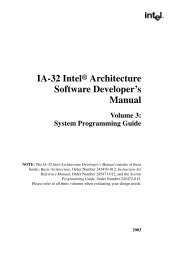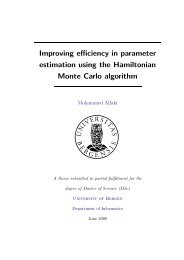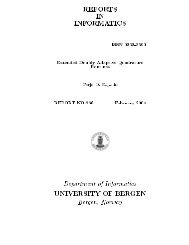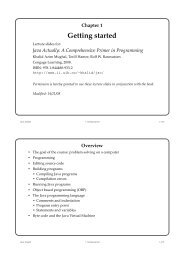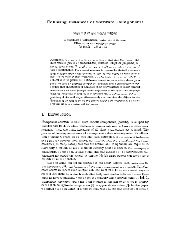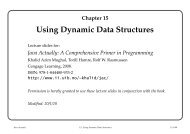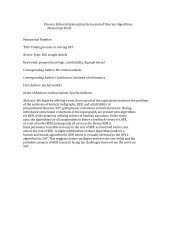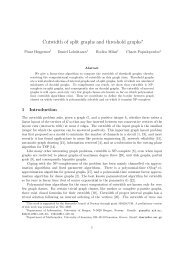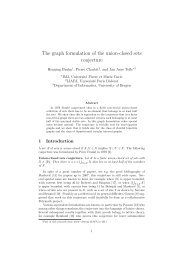- Page 1 and 2:
AMD64 Technology AMD64 Architecture
- Page 3 and 4:
26568—Rev. 3.05—September 2003
- Page 5 and 6:
26568—Rev. 3.05—September 2003
- Page 7 and 8:
26568—Rev. 3.05—September 2003
- Page 9 and 10:
26568—Rev. 3.05—September 2003
- Page 11 and 12:
26568—Rev. 3.05—September 2003
- Page 13 and 14:
26568—Rev. 3.05—September 2003
- Page 15 and 16:
26568—Rev. 3.05—September 2003
- Page 17 and 18:
26568—Rev. 3.05—September 2003
- Page 19 and 20:
26568—Rev. 3.05—September 2003
- Page 21 and 22:
26568—Rev. 3.05—September 2003
- Page 23 and 24:
26568—Rev. 3.05—September 2003
- Page 25 and 26:
26568—Rev. 3.05—September 2003
- Page 27 and 28:
26568—Rev. 3.05—September 2003
- Page 29 and 30:
26568—Rev. 3.05—September 2003
- Page 31 and 32:
26568—Rev. 3.05—September 2003
- Page 33 and 34:
26568—Rev. 3.05—September 2003
- Page 35 and 36:
26568—Rev. 3.05—September 2003
- Page 37 and 38:
26568—Rev. 3.05—September 2003
- Page 39 and 40:
26568—Rev. 3.05—September 2003
- Page 41 and 42:
26568—Rev. 3.05—September 2003
- Page 43 and 44:
26568—Rev. 3.05—September 2003
- Page 45 and 46:
26568—Rev. 3.05—September 2003
- Page 47 and 48:
26568—Rev. 3.05—September 2003
- Page 49 and 50:
26568—Rev. 3.05—September 2003
- Page 51 and 52:
26568—Rev. 3.05—September 2003
- Page 53 and 54:
26568—Rev. 3.05—September 2003
- Page 55 and 56:
26568—Rev. 3.05—September 2003
- Page 57 and 58:
26568—Rev. 3.05—September 2003
- Page 59 and 60:
26568—Rev. 3.05—September 2003
- Page 61 and 62:
26568—Rev. 3.05—September 2003
- Page 63 and 64:
26568—Rev. 3.05—September 2003
- Page 65 and 66:
26568—Rev. 3.05—September 2003
- Page 67 and 68:
26568—Rev. 3.05—September 2003
- Page 69 and 70:
26568—Rev. 3.05—September 2003
- Page 71 and 72:
26568—Rev. 3.05—September 2003
- Page 73 and 74:
26568—Rev. 3.05—September 2003
- Page 75 and 76:
26568—Rev. 3.05—September 2003
- Page 77 and 78:
26568—Rev. 3.05—September 2003
- Page 79 and 80:
26568—Rev. 3.05—September 2003
- Page 81 and 82:
26568—Rev. 3.05—September 2003
- Page 83 and 84:
26568—Rev. 3.05—September 2003
- Page 85 and 86:
26568—Rev. 3.05—September 2003
- Page 87 and 88:
26568—Rev. 3.05—September 2003
- Page 89 and 90: 26568—Rev. 3.05—September 2003
- Page 91 and 92: 26568—Rev. 3.05—September 2003
- Page 93 and 94: 26568—Rev. 3.05—September 2003
- Page 95 and 96: 26568—Rev. 3.05—September 2003
- Page 97 and 98: 26568—Rev. 3.05—September 2003
- Page 99 and 100: 26568—Rev. 3.05—September 2003
- Page 101 and 102: 26568—Rev. 3.05—September 2003
- Page 103 and 104: 26568—Rev. 3.05—September 2003
- Page 105 and 106: 26568—Rev. 3.05—September 2003
- Page 107 and 108: 26568—Rev. 3.05—September 2003
- Page 109 and 110: 26568—Rev. 3.05—September 2003
- Page 111 and 112: 26568—Rev. 3.05—September 2003
- Page 113 and 114: 26568—Rev. 3.05—September 2003
- Page 115 and 116: 26568—Rev. 3.05—September 2003
- Page 117 and 118: 26568—Rev. 3.05—September 2003
- Page 119 and 120: 26568—Rev. 3.05—September 2003
- Page 121 and 122: 26568—Rev. 3.05—September 2003
- Page 123 and 124: 26568—Rev. 3.05—September 2003
- Page 125 and 126: 26568—Rev. 3.05—September 2003
- Page 127 and 128: 26568—Rev. 3.05—September 2003
- Page 129 and 130: 26568—Rev. 3.05—September 2003
- Page 131 and 132: 26568—Rev. 3.05—September 2003
- Page 133 and 134: 26568—Rev. 3.05—September 2003
- Page 135 and 136: 26568—Rev. 3.05—September 2003
- Page 137 and 138: 26568—Rev. 3.05—September 2003
- Page 139: 26568—Rev. 3.05—September 2003
- Page 143 and 144: 26568—Rev. 3.05—September 2003
- Page 145 and 146: 26568—Rev. 3.05—September 2003
- Page 147 and 148: 26568—Rev. 3.05—September 2003
- Page 149 and 150: 26568—Rev. 3.05—September 2003
- Page 151 and 152: 26568—Rev. 3.05—September 2003
- Page 153 and 154: 26568—Rev. 3.05—September 2003
- Page 155 and 156: 26568—Rev. 3.05—September 2003
- Page 157 and 158: 26568—Rev. 3.05—September 2003
- Page 159 and 160: 26568—Rev. 3.05—September 2003
- Page 161 and 162: 26568—Rev. 3.05—September 2003
- Page 163 and 164: 26568—Rev. 3.05—September 2003
- Page 165 and 166: 26568—Rev. 3.05—September 2003
- Page 167 and 168: 26568—Rev. 3.05—September 2003
- Page 169 and 170: 26568—Rev. 3.05—September 2003
- Page 171 and 172: 26568—Rev. 3.05—September 2003
- Page 173 and 174: 26568—Rev. 3.05—September 2003
- Page 175 and 176: 26568—Rev. 3.05—September 2003
- Page 177 and 178: 26568—Rev. 3.05—September 2003
- Page 179 and 180: 26568—Rev. 3.05—September 2003
- Page 181 and 182: 26568—Rev. 3.05—September 2003
- Page 183 and 184: 26568—Rev. 3.05—September 2003
- Page 185 and 186: 26568—Rev. 3.05—September 2003
- Page 187 and 188: 26568—Rev. 3.05—September 2003
- Page 189 and 190: 26568—Rev. 3.05—September 2003
- Page 191 and 192:
26568—Rev. 3.05—September 2003
- Page 193 and 194:
26568—Rev. 3.05—September 2003
- Page 195 and 196:
26568—Rev. 3.05—September 2003
- Page 197 and 198:
26568—Rev. 3.05—September 2003
- Page 199 and 200:
26568—Rev. 3.05—September 2003
- Page 201 and 202:
26568—Rev. 3.05—September 2003
- Page 203 and 204:
26568—Rev. 3.05—September 2003
- Page 205 and 206:
26568—Rev. 3.05—September 2003
- Page 207 and 208:
26568—Rev. 3.05—September 2003
- Page 209 and 210:
26568—Rev. 3.05—September 2003
- Page 211 and 212:
26568—Rev. 3.05—September 2003
- Page 213 and 214:
26568—Rev. 3.05—September 2003
- Page 215 and 216:
26568—Rev. 3.05—September 2003
- Page 217 and 218:
26568—Rev. 3.05—September 2003
- Page 219 and 220:
26568—Rev. 3.05—September 2003
- Page 221 and 222:
26568—Rev. 3.05—September 2003
- Page 223 and 224:
26568—Rev. 3.05—September 2003
- Page 225 and 226:
26568—Rev. 3.05—September 2003
- Page 227 and 228:
26568—Rev. 3.05—September 2003
- Page 229 and 230:
26568—Rev. 3.05—September 2003
- Page 231 and 232:
26568—Rev. 3.05—September 2003
- Page 233 and 234:
26568—Rev. 3.05—September 2003
- Page 235 and 236:
26568—Rev. 3.05—September 2003
- Page 237 and 238:
26568—Rev. 3.05—September 2003
- Page 239 and 240:
26568—Rev. 3.05—September 2003
- Page 241 and 242:
26568—Rev. 3.05—September 2003
- Page 243 and 244:
26568—Rev. 3.05—September 2003
- Page 245 and 246:
26568—Rev. 3.05—September 2003
- Page 247 and 248:
26568—Rev. 3.05—September 2003
- Page 249 and 250:
26568—Rev. 3.05—September 2003
- Page 251 and 252:
26568—Rev. 3.05—September 2003
- Page 253 and 254:
26568—Rev. 3.05—September 2003
- Page 255 and 256:
26568—Rev. 3.05—September 2003
- Page 257 and 258:
26568—Rev. 3.05—September 2003
- Page 259 and 260:
26568—Rev. 3.05—September 2003
- Page 261 and 262:
26568—Rev. 3.05—September 2003
- Page 263 and 264:
26568—Rev. 3.05—September 2003
- Page 265 and 266:
26568—Rev. 3.05—September 2003
- Page 267 and 268:
26568—Rev. 3.05—September 2003
- Page 269 and 270:
26568—Rev. 3.05—September 2003
- Page 271 and 272:
26568—Rev. 3.05—September 2003
- Page 273 and 274:
26568—Rev. 3.05—September 2003
- Page 275 and 276:
26568—Rev. 3.05—September 2003
- Page 277 and 278:
26568—Rev. 3.05—September 2003
- Page 279 and 280:
26568—Rev. 3.05—September 2003
- Page 281 and 282:
26568—Rev. 3.05—September 2003
- Page 283 and 284:
26568—Rev. 3.05—September 2003
- Page 285 and 286:
26568—Rev. 3.05—September 2003
- Page 287 and 288:
26568—Rev. 3.05—September 2003
- Page 289 and 290:
26568—Rev. 3.05—September 2003
- Page 291 and 292:
26568—Rev. 3.05—September 2003
- Page 293 and 294:
26568—Rev. 3.05—September 2003
- Page 295 and 296:
26568—Rev. 3.05—September 2003
- Page 297 and 298:
26568—Rev. 3.05—September 2003
- Page 299 and 300:
26568—Rev. 3.05—September 2003
- Page 301 and 302:
26568—Rev. 3.05—September 2003
- Page 303 and 304:
26568—Rev. 3.05—September 2003
- Page 305 and 306:
26568—Rev. 3.05—September 2003
- Page 307 and 308:
26568—Rev. 3.05—September 2003
- Page 309 and 310:
26568—Rev. 3.05—September 2003
- Page 311 and 312:
26568—Rev. 3.05—September 2003
- Page 313 and 314:
26568—Rev. 3.05—September 2003
- Page 315 and 316:
26568—Rev. 3.05—September 2003
- Page 317 and 318:
26568—Rev. 3.05—September 2003
- Page 319 and 320:
26568—Rev. 3.05—September 2003
- Page 321 and 322:
26568—Rev. 3.05—September 2003
- Page 323 and 324:
26568—Rev. 3.05—September 2003
- Page 325 and 326:
26568—Rev. 3.05—September 2003
- Page 327 and 328:
26568—Rev. 3.05—September 2003
- Page 329 and 330:
26568—Rev. 3.05—September 2003
- Page 331 and 332:
26568—Rev. 3.05—September 2003
- Page 333 and 334:
26568—Rev. 3.05—September 2003
- Page 335 and 336:
26568—Rev. 3.05—September 2003
- Page 337 and 338:
26568—Rev. 3.05—September 2003
- Page 339 and 340:
26568—Rev. 3.05—September 2003
- Page 341 and 342:
26568—Rev. 3.05—September 2003
- Page 343 and 344:
26568—Rev. 3.05—September 2003
- Page 345 and 346:
26568—Rev. 3.05—September 2003
- Page 347 and 348:
26568—Rev. 3.05—September 2003
- Page 349 and 350:
26568—Rev. 3.05—September 2003
- Page 351 and 352:
26568—Rev. 3.05—September 2003
- Page 353 and 354:
26568—Rev. 3.05—September 2003
- Page 355 and 356:
26568—Rev. 3.05—September 2003
- Page 357 and 358:
26568—Rev. 3.05—September 2003
- Page 359 and 360:
26568—Rev. 3.05—September 2003
- Page 361 and 362:
26568—Rev. 3.05—September 2003
- Page 363 and 364:
26568—Rev. 3.05—September 2003
- Page 365 and 366:
26568—Rev. 3.05—September 2003
- Page 367 and 368:
26568—Rev. 3.05—September 2003
- Page 369 and 370:
26568—Rev. 3.05—September 2003
- Page 371 and 372:
26568—Rev. 3.05—September 2003
- Page 373 and 374:
26568—Rev. 3.05—September 2003
- Page 375 and 376:
26568—Rev. 3.05—September 2003
- Page 377 and 378:
26568—Rev. 3.05—September 2003
- Page 379 and 380:
26568—Rev. 3.05—September 2003
- Page 381 and 382:
26568—Rev. 3.05—September 2003
- Page 383 and 384:
26568—Rev. 3.05—September 2003
- Page 385 and 386:
26568—Rev. 3.05—September 2003
- Page 387 and 388:
26568—Rev. 3.05—September 2003
- Page 389 and 390:
26568—Rev. 3.05—September 2003
- Page 391 and 392:
26568—Rev. 3.05—September 2003
- Page 393 and 394:
26568—Rev. 3.05—September 2003
- Page 395 and 396:
26568—Rev. 3.05—September 2003
- Page 397 and 398:
26568—Rev. 3.05—September 2003
- Page 399 and 400:
26568—Rev. 3.05—September 2003
- Page 401 and 402:
26568—Rev. 3.05—September 2003
- Page 403 and 404:
26568—Rev. 3.05—September 2003
- Page 405 and 406:
26568—Rev. 3.05—September 2003
- Page 407 and 408:
26568—Rev. 3.05—September 2003
- Page 409 and 410:
26568—Rev. 3.05—September 2003
- Page 411 and 412:
26568—Rev. 3.05—September 2003
- Page 413 and 414:
26568—Rev. 3.05—September 2003
- Page 415 and 416:
26568—Rev. 3.05—September 2003
- Page 417 and 418:
26568—Rev. 3.05—September 2003
- Page 419 and 420:
26568—Rev. 3.05—September 2003
- Page 421 and 422:
26568—Rev. 3.05—September 2003
- Page 423 and 424:
26568—Rev. 3.05—September 2003
- Page 425 and 426:
26568—Rev. 3.05—September 2003
- Page 427 and 428:
26568—Rev. 3.05—September 2003
- Page 429 and 430:
26568—Rev. 3.05—September 2003
- Page 431 and 432:
26568—Rev. 3.05—September 2003



